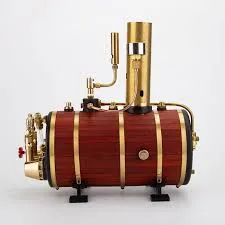
Jul . 27, 2024 01:34 Back to list
Factors Influencing the Efficiency of Steam Boilers in Industrial Applications and Their Impact on Performance
The Efficiency of Steam Boilers An Overview
Steam boilers are critical components in various industrial processes, generating steam that can be used for heating, power generation, and various manufacturing applications. The efficiency of a steam boiler is a vital criterion that determines its performance, operational costs, and environmental impact. In this article, we will explore the factors that influence steam boiler efficiency, its significance, and strategies for improvement.
Understanding Steam Boiler Efficiency
Boiler efficiency refers to the ratio of useful energy output to the energy input, typically expressed as a percentage. For steam boilers, this means the proportion of energy contained in the fuel that is converted into steam energy. A steam boiler's efficiency can significantly affect operational costs, as higher efficiency translates to lower fuel consumption and reduced emissions.
Two primary types of efficiency are often considered thermal efficiency and combustion efficiency. Thermal efficiency focuses on the actual steam produced against the fuel consumed, while combustion efficiency pertains to how effectively the fuel is burned. Ensuring high values in both categories is essential for maximizing boiler performance.
Factors Influencing Steam Boiler Efficiency
Several factors influence the efficiency of a steam boiler
1. Design and Technology The construction and technological advancements in boiler design play a pivotal role. Modern boilers often incorporate features such as economizers and superheaters to increase efficiency by recovering waste heat and enhancing steam temperature, respectively.
2. Fuel Type The type of fuel used can also impact efficiency. Different fuels have varying energy contents and combustion characteristics. For example, natural gas typically burns more efficiently than heavy fuel oil.
3. Water Quality The quality of the feedwater directly affects boiler efficiency. Impurities can lead to scaling and corrosion, which hinder heat transfer and increase fuel consumption. Proper water treatment is essential to maintain efficiency.
4. Operating Conditions The operational parameters, including pressure and temperature, must be optimized for efficiency. Boilers should be operated close to their design specifications to maximize performance.
efficiency of steam boiler

5. Maintenance Practices Regular maintenance and servicing can prevent efficiency losses due to wear and tear. Routine inspections, cleaning, and adjustments ensure that the boiler operates at peak performance.
Improving Steam Boiler Efficiency
To enhance the efficiency of steam boilers, operators can adopt several strategies
1. Regular Monitoring Implementing a monitoring system to track efficiency metrics allows for real-time assessments and timely interventions. Tools such as flow meters and pressure gauges can help in monitoring performance.
2. Energy Audits Conducting energy audits can identify inefficiencies within the system. This evaluation can lead to targeted improvements and recommendations for better energy management.
3. Heat Recovery Systems Installing heat recovery systems to capture and reuse waste heat from the flue gases can significantly improve overall efficiency. This recovered energy can be redirected for pre-heating feedwater or for other processes.
4. Training Operators Training personnel on best operational practices can result in better handling of the system, leading to optimal performance. Well-informed operators can make real-time decisions that enhance efficiency.
5. Upgrade Technology Consider investing in modern, high-efficiency boiler systems. Although the initial investment may be higher, the long-term savings in fuel costs and reduced emissions can justify the expense.
Conclusion
The efficiency of steam boilers is crucial for cost-effectiveness and environmental sustainability in industrial operations. By understanding the factors that influence efficiency and implementing strategies for improvement, facilities can optimize their steam systems. Ultimately, enhancing boiler efficiency not only translates into significant economic benefits but also contributes to a greener and more sustainable future.
-
High-Efficiency Commercial Oil Fired Steam Boiler for Industry
NewsJul.30,2025
-
High-Efficiency Biomass Fired Thermal Oil Boiler Solutions
NewsJul.30,2025
-
High Efficiency Gas Fired Thermal Oil Boiler for Industrial Heating
NewsJul.29,2025
-
High-Efficiency Gas Fired Hot Water Boiler for Sale – Reliable & Affordable
NewsJul.29,2025
-
High Efficiency Biomass Fired Hot Water Boiler for Industrial and Commercial Use
NewsJul.29,2025
-
High-Efficiency Biomass Fired Hot Water Boiler for Industrial Use
NewsJul.28,2025
Related PRODUCTS






















